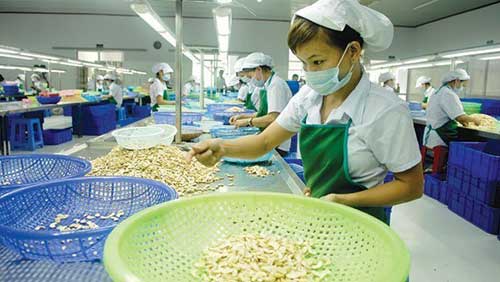Import price hikes anticipated, importers indecisive about plans
Friday, 10:50, 28/08/2015
The dong devaluation will make goods, especially imports, become more expensive, but analysts say prices will increase slowly.
Automobile joint-ventures and car distributors have not made any price adjustments since August 12, though the State Bank has devalued the dong by one percent and widened the forex trading band by two percent.
However, a car dealer said the car price was very likely to go up in several days. Not only importers, but domestic car assemblers will also have to raise selling prices, because the weaker dong will make car components more expensive.
He said the price adjustment may be made soon and the price increase would be 2-3%.
However, a source from Euro Auto, the authorized distributor of BMW and MINI products, said the company might not raise the selling price.
An analyst said with the latest foreign exchange adjustment, the dong has lost 2.7% of its value against the euro, but the dong still has appreciated by 6.12% against the euro this year.
 A fruit importer said the latest foreign exchange adjustment has not affected the selling prices yet, because the company was still fulfilling the old orders. However, fruit imports price would increase by 5-10% in 10-15 days.
A fruit importer said the latest foreign exchange adjustment has not affected the selling prices yet, because the company was still fulfilling the old orders. However, fruit imports price would increase by 5-10% in 10-15 days.
Meanwhile, Luu Son Thuy from Ket Phat Thinh Service & Trade Company, specializing in importing and distributing Australian cows, said the import prices have increased because of the dollar price increase, while the domestic selling prices remain low. Therefore, the company has decided to halt imports.
“We plan to resume imports in half a month. However, we are uncertain about the plan, because the dong has depreciated by one percent,” Thuy said.
Dinh Cong Khuong, CEO of Khuong Mai Steel Company, said the foreign exchange rate adjustment had affected all steel companies.
“If you imported products six months ago and sold all of the imports, you will surely take a loss because you have to buy dollars at higher prices to pay debts,” he explained.
“If you just have imported goods, you will suffer because the cost price is higher, while you cannot raise the selling prices if the steel price is on decreasing,” he said, adding that the import price has fallen by US$200 per tonne since June 2014.
Maybank Kim Eng Securities’ analysis division warned that the biggest sufferers from the exchange rate adjustment are businesses with big debts in dollars.
Sea transport companies are such businesses. A report showed the businesses’ average ratio of debt on stockholder equity is at 0.87, while the ratio is up to 3.7 for some companies.
However, a car dealer said the car price was very likely to go up in several days. Not only importers, but domestic car assemblers will also have to raise selling prices, because the weaker dong will make car components more expensive.
He said the price adjustment may be made soon and the price increase would be 2-3%.
However, a source from Euro Auto, the authorized distributor of BMW and MINI products, said the company might not raise the selling price.
An analyst said with the latest foreign exchange adjustment, the dong has lost 2.7% of its value against the euro, but the dong still has appreciated by 6.12% against the euro this year.

Meanwhile, Luu Son Thuy from Ket Phat Thinh Service & Trade Company, specializing in importing and distributing Australian cows, said the import prices have increased because of the dollar price increase, while the domestic selling prices remain low. Therefore, the company has decided to halt imports.
“We plan to resume imports in half a month. However, we are uncertain about the plan, because the dong has depreciated by one percent,” Thuy said.
Dinh Cong Khuong, CEO of Khuong Mai Steel Company, said the foreign exchange rate adjustment had affected all steel companies.
“If you imported products six months ago and sold all of the imports, you will surely take a loss because you have to buy dollars at higher prices to pay debts,” he explained.
“If you just have imported goods, you will suffer because the cost price is higher, while you cannot raise the selling prices if the steel price is on decreasing,” he said, adding that the import price has fallen by US$200 per tonne since June 2014.
Maybank Kim Eng Securities’ analysis division warned that the biggest sufferers from the exchange rate adjustment are businesses with big debts in dollars.
Sea transport companies are such businesses. A report showed the businesses’ average ratio of debt on stockholder equity is at 0.87, while the ratio is up to 3.7 for some companies.
